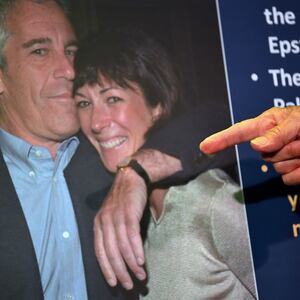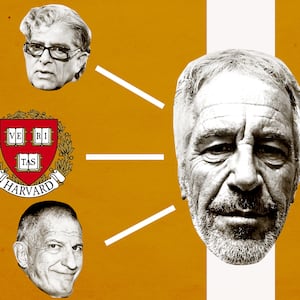For a third time, a Manhattan federal judge has denied Ghislaine Maxwell’s request for bail before her trial in connection to Jeffrey Epstein’s sex-trafficking ring.
In a ruling on Monday, U.S. District Judge Alison Nathan wrote: “If the Court could conclude that any set of conditions could reasonably assure the Defendant’s future appearance, it would order her release. Yet while her proposed bail package is substantial, it cannot provide such reasonable assurances.”
The 59-year-old socialite is charged with grooming, recruiting and abusing underage girls for Epstein, her former boyfriend and employer, in the 1990s. Maxwell pleaded not guilty and has long denied any involvement in Epstein’s scheme.
Maxwell became the primary target of federal prosecutors’ investigation into Epstein’s trafficking ring after the 66-year-old multimillionaire killed himself in a Manhattan jail in August 2019. The feds arrested her in July of last year, after tracking her to a secluded New Hampshire luxury hideaway, which was patrolled by private security guards.
She has attempted to win release from Brooklyn’s Metropolitan Detention Center for months, submitting glowing letters from family—including her husband Scott Borgerson—and most recently offering to renounce her French and British citizenship and place millions of her and her spouse’s assets in an independently monitored bank account.
The latter proposals, however, didn’t sway Nathan, who questioned the “enforceability and practical impact of” Maxwell’s citizenship renunciations. The federal judge said Maxwell would still “be able to successfully resist, or at least delay, extradition,” especially with the aid of her international connections.
As for the proposal to have a retired judge monitor Maxwell’s funds, Nathan said the socialite “would continue to have access to substantial assets—certainly enough to enable her flight and to evade prosecution.”
Those assets would include $450,000 Maxwell proposed keeping for living expenses and “any future salaries for her or her spouse, along with other assets, including jewelry and other chattels, that are potentially worth hundreds of thousands of dollars,” Nathan wrote, adding that while those amounts are a fraction of Maxwell’s wealth, “they represent a still-substantial amount that could easily facilitate flight.”
In recent weeks, the Maxwell family has embarked on a media blitz with help from their Miami-based attorney David Oscar Markus, whose website boasts that he was mentored by Alan Dershowitz at Harvard Law School. At least two victims of Epstein have claimed Dershowitz also sexually abused them, but Dershowitz adamantly denies the claims.
Markus penned an op-ed against Maxwell’s solitary confinement—and has also publicly defended Dershowitz and former U.S. Attorney Alex Acosta, who brokered Epstein’s shady 2008 plea deal—and appears to have helped her siblings launch a Twitter handle to publicly defend her. “It is our mission to shine light on the real Ghislaine, not the figure of fiction caricatured by the media,” one post declared. Her brother, Ian Maxwell, told the BBC her conditions in the Brooklyn jail are “degrading” and amount to “torture.”
Last week, Ian Maxwell even suggested in an interview with the Washington Post that his sister could be an advocate for criminal justice reform. “She has an opportunity to try to use her name and her case to try and improve conditions. That’s what she definitely wants to do,” the sibling told the newspaper.
In a February letter to Judge Nathan, Maxwell’s legal team claimed she was “withering to a shell of former self” in the federal lockup. They complained of guards searching her hundreds of times in her isolation cell—claiming she’d been “physically abused” during one patdown—and of “odorous” tap water and a lack of “properly heated” meals.
Federal prosecutors, however, argued that the court twice denied Maxwell’s bail after determining she posed a significant flight risk and should rule the same again.
Assistant U.S. Attorneys Maurene Comey, Alison Moe and Lara Pomerantz wrote Judge Nathan on March 9 to say Maxwell’s latest round of bail proposals—revoking her foreign citizenship and stashing her millions in an account tracked by a former federal judge—would not “reasonably assure the defendant’s appearance in court, and neither outweighs all of the other factors that make this defendant an extreme flight risk.”
The prosecutors said Maxwell “could choose to flee to another jurisdiction altogether, including one with which the United States does not have an extradition treaty and from which extradition is impossible.” They also raised questions on Maxwell’s “lack of candor” about her finances and noted her recent proposal “does not in any way restrain her $2 million townhouse in London, which she could live in or sell to support herself.”
Maxwell faces four felony charges relating to child sex trafficking and two counts of perjury in connection to a 2016 deposition in a lawsuit filed by a victim of Epstein. If convicted, she could spend the rest of her life behind bars.
According to the indictment, Maxwell recruited and groomed three underage girls for Epstein to abuse between 1994 and 1997. “Maxwell first attempted to befriend some of Epstein’s minor victims prior to their abuse, including by asking the victims about their lives, their schools, and their families,” the indictment states.
“Having developed a rapport with a victim, Maxwell would try to normalize sexual abuse,” the document says, adding that she enticed the girls to travel to Epstein’s mansions in New York, New Mexico and Florida and her London townhouse.








